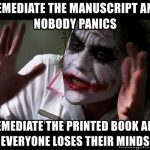Exploring concepts of change and influence in the history of primary technological communication provides useful and surprising insights to anyone seeking to create effective education products implementing modern technology. In Orality and Literature, Walter Ong offered both useful understanding of technological implication as well as over-reaching conclusions he was not qualified to offer, such as “The use of technology can enrich the human psyche, enlarge the human spirit, intensify its interior life.” (Ong, 2015, p. 82).
Ong put technology out of people’s influence, made it a thing independent of human influence (Ong, 2015, p. 14). He set it as a cause and not an interactive, interwoven part of society. But just as we see new words being kept in vernacular or not, apps experiencing widespread usage or not; new technologies only enter into influential usage when there is widespread acceptance by the society in which it is being introduced. These technologies are created and introduced into usage by a human mind, and can only become a thing that is influential if it meets a need and reaches a cognitive rapport. In contrast with the idea of technological imperatives (Chandler, 1995b), many frustrated inventors and app creators can attest to a historical garbage dump of unused technology. The much-maligned technological autonomy, the idea that technology causes change and is independent of human influence (Chandler, 1995a), should be addressed widely in modern public forum. As quite newly introduced digital technology continues to permeate in western societies, there are often complaints about it’s negative influences. This often presents as fatalistic and sounds of technological determinism. A much more useful dialogue would entail addressing concerns and how the technology can be altered to address those concerns, knowing that we are not reserved to a fate of technological servitude. In fact, our technologies only exist because we consent to their positive and negative effects which we are able to mitigate (Engell & O’Donnell, 1999).
Ong spoke of how authors in newly-used technologies emulated and pitied the loss of old technologies, even revered them, while at the same time writing fully inside the cognitive framework of new technologies (Ong, 2015, p. 79). I am seeing this happen in current iterations of the usage and implementation of new technologies. Online courses are often simply emulations of old ways of doing things. Some courses, such as accredited personal training courses, are composed of downloading a simple PDF document (like a traditional course textbook) and after independently reading the PDF, taking an online exam (like a traditional final exam). This does nothing to enhance the benefits of online courses such as guided exploring of abundant online research sources and responsive course design or to mitigate disadvantages such as student remoteness and lack of test proctoring. It is simply an attempt to clumsily emulate course structures used in past technological formats. To use technology effectively, new approaches which thoughtfully address the balance of improvements and detriments associated with modern technology are needed.
Ong overreaches in his broad conclusions, but seems more on point with his examination of the specific characteristics of oral culture:
…despite its dominance, prestige and ubiquity, print-literacy is an exception in a much longer trajectory of human thought, which may be in the process of restoring earlier modes of communications based on speech and instantaneity rather than space and time-delay
(Hartley, 2015, p. 2017). Ong’s observations on oral culture seem to deeply correlate with emerging trends in digital culture. From Ong’s points, we can learn that it is important when we are instructing via new technology, that we are instructing thoughtfully in the new technological format. As we embark on creating effective and useful courses benefitting from new technology, we should be cognisant of our mindsets.
References
Chandler, D. (1995a). Technological or Media Determinism: Technological Autonomy. Retrieved from: http://visual-memory.co.uk/daniel/Documents/tecdet/tdet06.html
Chandler, D. (1995b). Technological or Media Determinism: The ‘Technological Imperative’. Retrieved from: http://visual-memory.co.uk/daniel/Documents/tecdet/tdet07.html
Engell, J. (Presenter) & O’Donnell, J. (Presenter). (1999). From Papyrus to Cyberspace [radio broadcast]. Retrieved from https://canvas.ubc.ca/courses/4290/files/609973/preview
Hartley, J. (2015) After Ongism. in Ong, W. J. (2015). Orality and Literacy: The technologizing of the Word, (30th Anniversary Ed.). London;New York;: Routedge.



